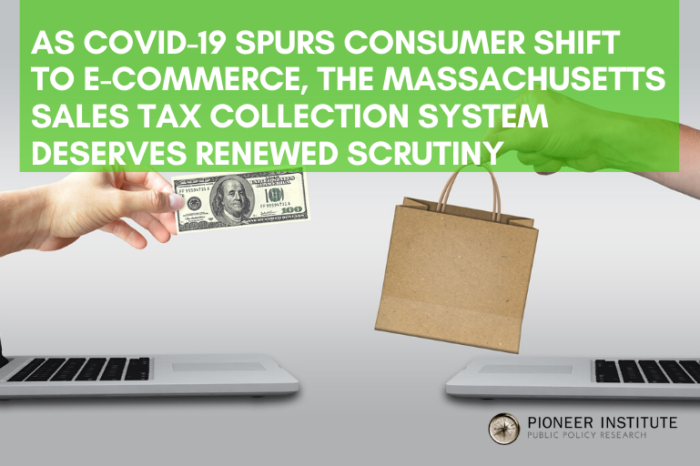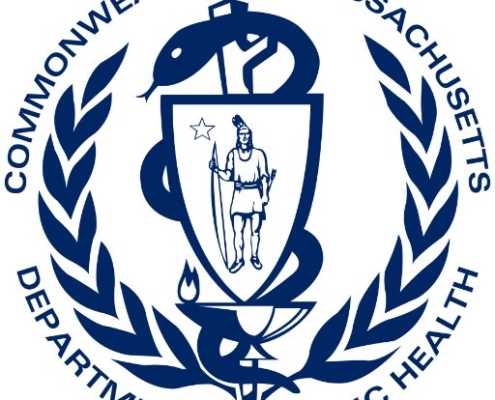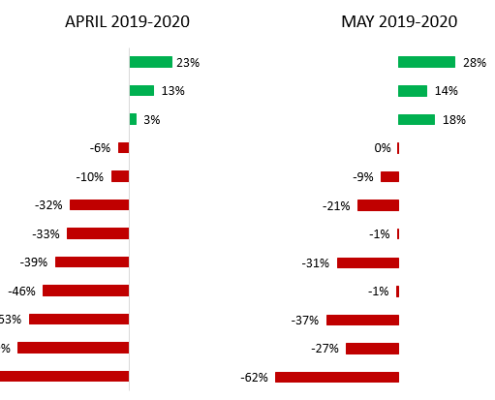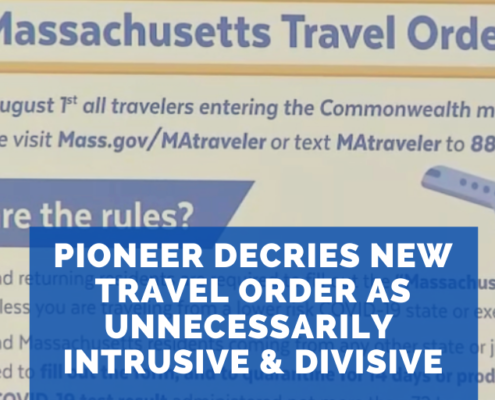Pioneer Institute Study Calls for Streamlining State Sales Tax Revenue Collection
Reforms would speed collection as state tax revenue plummets
BOSTON – At a time when state tax revenues are plummeting, a plan to modernize sales tax collection could get money into state coffers more quickly, according to a new policy brief published by Pioneer Institute.
“Commonly used technology makes it possible for businesses to remit the sales taxes they owe more quickly without having to adopt expensive new systems,” said Greg Sullivan, co-author with Andrew Mikula, of “As COVID-19 Pandemic Spurs Consumer Shift to E-Commerce, the Massachusetts Sales Tax Collection System Deserves Renewed Scrutiny.” “This would allow the Commonwealth to collect much-needed interest on the funds.”
Social distancing measures and the closing of non-essential businesses were necessary to control the spread of COVID-19, but they caused retail sales to plummet. The Massachusetts Taxpayers Foundation now estimates that state sales tax revenues for the upcoming fiscal year will be over $2 billion less than it had projected in January 2020, a drop of more than 27 percent. Sales taxes are expected to account for more than a third of the anticipated drop in overall tax receipts.
The shutdown has had a particularly devastating impact on brick and mortar retailers that were already struggling with the rise of online shopping. According to Euler Hermes, a credit insurance firm, the U.S. has lost 56,000 retail stores since 2008, accounting for 670,000 jobs.
“For the retail sector, COVID-19 has been like pouring gasoline on a fire that was already raging,” said Pioneer Executive Director Jim Stergios.
A two-part proposal Governor Baker included in his January state budget submission aims to streamline state sales tax collections.
Under current law, retailers file monthly returns and remit sales taxes collected until the 20th of the month. Under Baker’s plan, retail establishments that collected more than $100,000 in sales taxes over the previous 12 months would have to remit taxes owed during the first three weeks of a month during the final week of the same month. Taxes collected during the final week would be due the next month.
Only 10 percent of state businesses meet the $100,000 sales tax threshold, but they account for 90 percent of sales tax revenue.
Currently, merchants are entirely responsible for collecting sales taxes and remitting the money to the state Department of Revenue (DOR). When a retail customer makes a purchase with a credit or debit card, a third-party processor requests authorization for the purchase amount from the card company. If it’s authorized, the processor approves the transaction and processes payment from the credit or debit card’s sponsoring financial institution to the merchant.
Under the governor’s proposal, taxes owed would flow directly to DOR instead of first going to the merchant.
Opponents of the plan argue that implementing the plan would require one-time costs of $1.2 billion, including $418 million for retailers, $99 million for telecommunications providers and $700 million for payment processors. They estimate recurring annual costs to be $28 million.
Supporters counter that the cost to retailers would be minimal, since no hardware changes would be needed to replace existing point-of-sale card reading devices and that costs to other parties would be far less than opponents claim.
Sullivan and Mikula find that the first part of Baker’s plan makes sense and is entirely feasible because advances in electronic data processing and electronic funds transfer have eliminated the need for protracted remittance timetables. Nineteen states already require these advance tax payments.
They recommend a scaled-down adoption of the second part of Gov. Baker’s proposal, arguing that it should only be applied to businesses with annual sales of $10 million or more. This approach would allow the Commonwealth to determine how well direct payments from third-party processes to DOR work before determining if it makes sense to expand the practice.
About the Authors
Gregory Sullivan is Pioneer’s Research Director. Prior to joining Pioneer, Sullivan served two five-year terms as Inspector General of the Commonwealth of Massachusetts, and held several positions within that office previously. Sullivan was a 17-year member of the Massachusetts House of Representatives, serving on the committees of Ways and Means, Human Services, and Post-Audit and Oversight. Greg holds a bachelor’s degree from Harvard College, a master’s degree in public administration from The Kennedy School of Public Administration at Harvard, and a master’s degree from the Sloan School at M.I.T., with a concentration in finance.
Andrew Mikula is the Lovett & Ruth Peters Economic Opportunity Fellow at Pioneer Institute. Mr. Mikula was previously a Roger Perry Government Transparency Intern at Pioneer Institute and studied economics at Bates College.
About Pioneer
Mission
Pioneer Institute develops and communicates dynamic ideas that advance prosperity and a vibrant civic life in Massachusetts and beyond.
Vision
Success for Pioneer is when the citizens of our state and nation prosper and our society thrives because we enjoy world-class options in education, healthcare, transportation and economic opportunity, and when our government is limited, accountable and transparent.
Values
Pioneer believes that America is at its best when our citizenry is well-educated, committed to liberty, personal responsibility, and free enterprise, and both willing and able to test their beliefs based on facts and the free exchange of ideas.
Get Our COVID-19 News, Tips & Resources!
Related Posts













